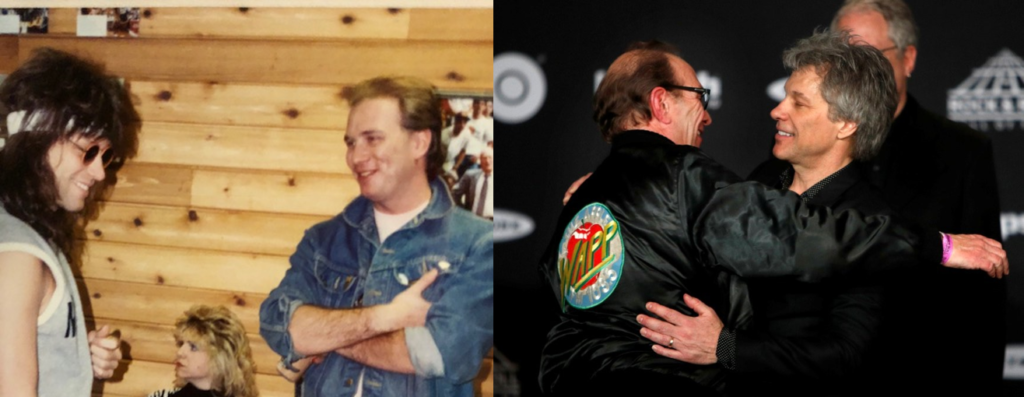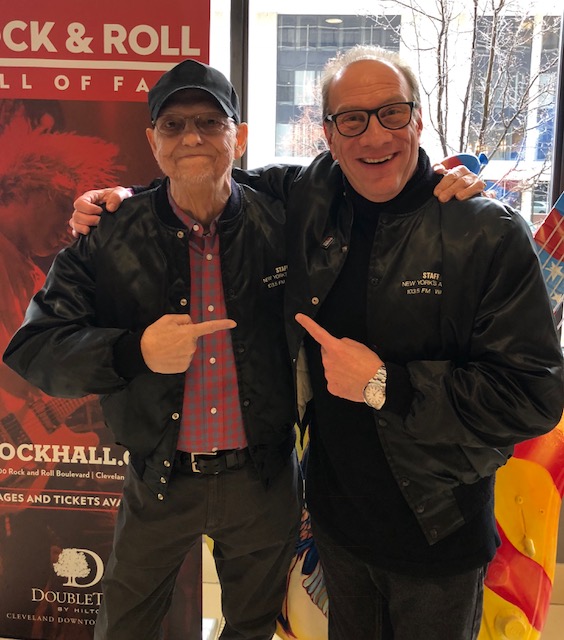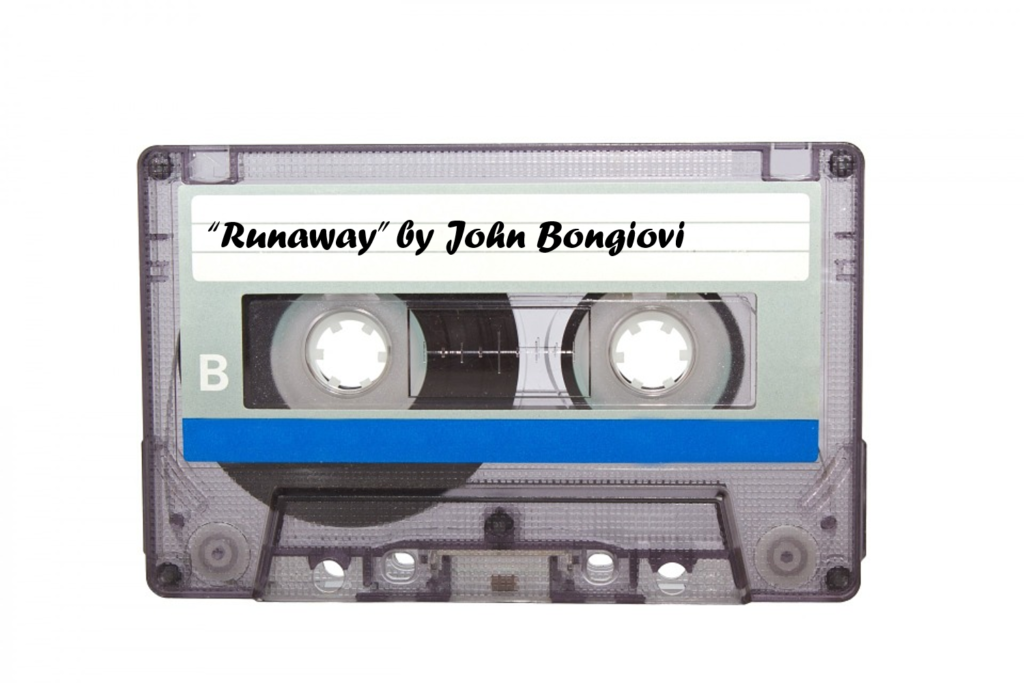
Induction ceremonies at the Rock & Roll Hall of Fame are almost always memorable. Introduction speeches are emotional, families and friends are on hand, and the artists themselves are almost always moved by the gravity of the moment.
But at last Saturday’s ceremony, there was a definite “radio subtext” as media consultant and publicist, Stacey Sherman, explained to me.
That’s because when 20 year-old John Bongiovi was out of ideas about how to get anyone in the music business to pay attention to his songs, it was a radio station that saved the day.
He strolled into a new station in New York City – Doubleday’s WAPP – and got the attention of DJ Chip Hobart and promotion director John Lassman.
From his induction speech (thanks to Variety’s Michele Amabile Angermiller), Jon Bon Jovi – as you know him today – took the time to thank Hobart, Lassman, and radio for launching his radio career:
“After sending that cassette to every label and manager I could think of, I thought, ‘Who is the loneliest person in the music business?…the DJ.”
Lassman and Hobart ended up putting “Runaway” on WAPP’s album showcasing local talent, “Hometown.” And the rest, as they say, is history.

As Stacey told me, “John and Chip were sitting right behind me in the press room, so it was very cool to listen to them all night. Their reaction was off the hook. I mentioned it to Jon at his party later, and his reaction was equally touching.”
Bon Jovi’s nod to radio wasn’t the only one of the night. The Moody Blues’ Justin Hayward and John Lodge paid tribute to Howard Stern, as well as WNEW-FM’ legends Scott Muni and Alison Steele.
But it was Bon Jovi who articulated that amazing relationship between rock radio jocks and the music they play:
“(The DJ) was the one that loved music more than anyone because he had to determine what people cared to listen to, and a DJ could educate the public as to what to listen to. It was a different era, and it goes back to this kid’s story.”
Lassman and I worked together at KQRS/Minneapolis (where he has returned to produce Tom Barnard’s morning show), and he agrees with Jon. While perhaps a bit jaded by his decades spent in radio, “Johnny Rock” told me the ’80s were a very different time for radio and breaking new music:
“The days of a DJ and a 19 year-old promotion director greenlighting such things are long gone. At Cumulus, we have a very successful nationwide talent search called ‘neXt2rock.’ Maybe the next Hall of Famer will come from there.”
A big factor in Bon Jovi’s eventual success was the persistence of young John Bongiovi himself. Lassman recalled, “He had laser focus – nothing was going to keep him from making it, or at least that’s how he felt. Before he got the record deal, I remember Jon asking me for Gary Stevens‘ (president of Doubleday Broadcasting) address to send him flowers as a thank-you for including him on the ‘Hometown’ album. Jon knew how to work it.”
 But it was radio airplay – and support from a struggling new station named after The Big Apple – that propelled Bon Jovi that year. While WAPP was gone in just one year, Bon Jovi’s music endures, now achieving Hall of Fame notoriety. Not many radio stations have that much impact in their first year.
But it was radio airplay – and support from a struggling new station named after The Big Apple – that propelled Bon Jovi that year. While WAPP was gone in just one year, Bon Jovi’s music endures, now achieving Hall of Fame notoriety. Not many radio stations have that much impact in their first year.
At a time when many media observers question radio’s ability to be a taste maker, a music discovery vehicle, and an influencer, the story of a tenacious young rocker, a DJ, and a radio promotions guy is a reminder to all of us of radio’s power.
Even today with tools like Shazam, Spotify, and YouTube, Lassman gives us this reminder:
“Radio is still the most important element in the development of a new rock artist.”
I don’t think you’d get much of an argument about that claim from Jon Bon Jovi.
Thanks to Lori Lewis for planting the seed.
- The Exponential Value of Nurturing Radio Superfans - April 28, 2025
- What To Do If Your Radio Station Goes Through A Midlife Crisis - April 25, 2025
- A 2020 Lesson?It Could All Be Gone In A Flash - April 24, 2025




Those of us who experienced breaking records, seeing today’s Hall of Fame artists at their small introductory venues, shaking hands in the very beginning, relate to radio results. “Picking the hits” is more than magic. Radio wins when we think out of the box. Don’t stop thinking about tomorrow. The Future is Now.
Believe it or not It happened just over 10 years ago in Grand Rapids, Michigan when a local band out of Muskegon, Michigan asked for a meeting with me (the PD of WGRD at the time) to play their new album. After much prodding from the night jock I finally agreed to meet with them.
I was so impressed with how professional the product sounded and the passion the band exuded that I gave em a shot on the air with a song called “Someone Like You”.
Now I expected the band fan base would be vigorously calling in with requests once we began playing the track but I never expected calls pouring in with, not only requests for the song but lots of inquiries about the band. Who are they, where they from etc… I knew at that point the band was something special.
Needless to say, the bands status on our playlist rose and with that; attention from several record labels. They signed on with a professional management company shortly afterward and soon found themselves being played not only on WGRD but on radio stations all over the country.
Now if you’ll have to excuse me, because I always get this huge smile on my face every time I see a #1 ranking on the rock charts or a picture of this band playing front of thousands. I can’t help it though because it gives me such great pride to know first hand how the band Pop Evil rose among the ranks in the rock world propelled by their own hard work and of course, legions of fans of rock radio across the country.
JT
WCSX Detroit
Great story, JT, and thanks for that great reminder about the power of radio.
Having never worked in or programmed country radio, I am always envious when watching the CMA Awards when, almost unfailingly, artist after artist thanks “country radio.”
That genre seems to never have lost sight of the mutually beneficial relationship that makes radio not a subtext but rather a perpetual subcurrent.
True that. I feel the same way, Eric. That’s probably why Lassman & Hobart were so excited to be acknowledged by Jon. Thanks for the comment.
Great blog Fred — John Lassman one of the all-time BEST people in our business!
Also, another great programmer named Dave Hamilton was at the helm at WAPP during this time!
That Doubleday team gave me a run for my money. Glad I was able to work with so many of you later in my career. All the best, David.
Didn’t Jon Bon Jovi record the TM jingle package that accompanied Doubleday’s “Rockradio” attempt to do an AOR/CHR hybrid?
Mark, that’s something I don’t know. Maybe someone else reading these comments has that info.
Greta Van Fleet.
13 months ago they were still in their parents basement in Frankenmuth.
Week of April 10, 2017 they had their first radio ‘spin’ with Highway Tune which went to #1 as did Safari Song. Meteoric rise, from radio.
Doug Elliott
94.9 The Rock
Toronto
Doug, GVF is a great exmaple of a modern-day radio breakout. And of course, they have a special place for me because they’re just up the road in Frankenmuth, MI. Thanks for the comment.
The “Magic” of radio and the connection between the Jock & Listener is intimate and priceless. At least is was to me as a teenager in the summer of 82 and WAPPs commercial free summer.
Those local jocks were cheerleaders for Bonjovi, Twisted Sister and bands that didn’t break as big like Zebra & Shooting Star.
Those were the days. Sirius does what it can to recapture that magic.
Those Doubleday stations (of which WAPP was one) played a lot of different rock bands, including the ones you mentioned including Triumph, Whitesnake, etc. They were slick, sparse, and you mentioned, commercial-free for their first few months. I competed against WLLZ in Detroit when I was at WRIF and it was highly challenging. Thanks for the comment, James.